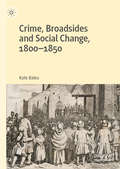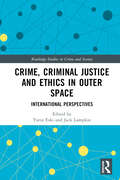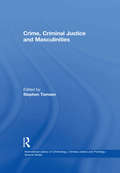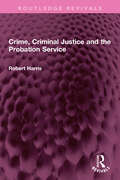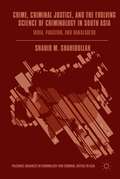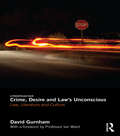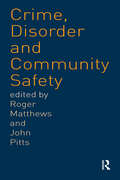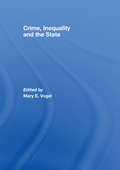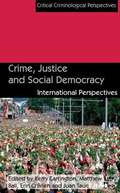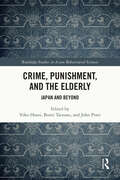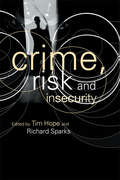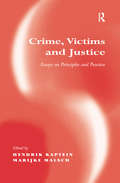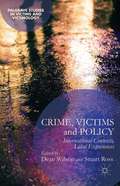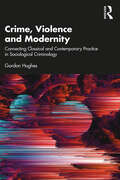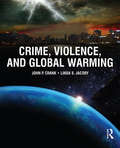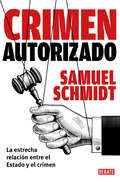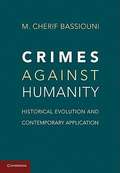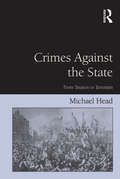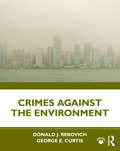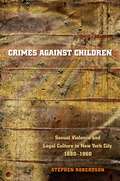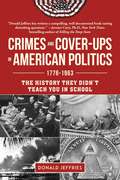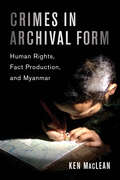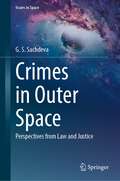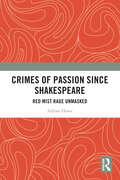- Table View
- List View
Crime, Broadsides and Social Change, 1800-1850
by Kate BatesThis book explores the form, function and meaning of crime and execution broadsides printed in nineteenth-century Britain. By presenting a detailed discourse analysis of 650 broadsides printed across Britain between the years 1800-1850, this book provides a unique and alternative interpretation as to their narratives of crime. This criminological interpretation is based upon the social theories of Emile Durkheim, who recognised the higher utility of crime and punishment as being one of social integration and the preservation of moral boundaries. The central aim of this book is to show that broadsides relating to crime and punishment served as a form of moral communication for the masses and that they are examples of how the working class once attempted to bolster a sense of stability and community, during the transitional years of the early nineteenth century, by effectively representing both a consolidation and celebration of their core values and beliefs.
Crime, Criminal Justice and Ethics in Outer Space: International Perspectives (Routledge Studies in Crime and Society)
by Yarin EskiBreaking new ground in criminology, this book reflects on the expansion of outer space endeavours, the new pathways this presents for crime, challenges to Earth-based conceptions of justice, and the ethical issues raised.This book is the first edited collection of chapters focused on how to prepare for, address and respond to, instances of criminal and harmful behaviour in (and related to) outer space. It also considers what criminal justice might look like in outer space, and how the important arena of ethics might play a pivotal role in helping overcome problems related to crime and crime control. The book comprises 24 chapters from authors spanning six continents, giving a truly international dimension to the first anthology relating to the intersection of space criminology, space criminal justice and space ethics. It is this international dimension that is essential to the development of a holistic understanding of crime, criminal justice and ethics in outer space.Exploring recent topics, including the dark origin of space exploration, expansion of satellite industries, space tourism, asteroid mining and human settlement on the Moon and Mars, the book will appeal to space professionals, and students and researchers working in criminology, critical security studies, law, and ethics.
Crime, Criminal Justice and Masculinities (International Library Of Criminology, Criminal Justice And Penology - Second Ser.)
by Stephen TomsenThis volume features the leading contemporary articles that are part of, or related to, the 'new masculinities' approach in this sphere. These comprise an impressive range of theoretical and empirical work including important cultural and ethnographic analyses. They emphasise the relationship between masculinities, the causes and patterns of most criminal offending and victimisation and the broader workings of the wider criminal justice system of policing (public and private), criminal courts, corrections and prisons. All of the material has been selected from flagship international journals and was produced by a global mix of male and female researchers with diverse disciplinary backgrounds. These scholars share the view that masculinities are plural, socially constructed, reproduced in the collective social practices of different men and embedded in institutional and occupational settings. Furthermore, masculinities are intricately linked with social struggles for power that occur between men and women and different men. Crime, criminal justice and their cultural representation are key terrain for these masculine contests and are always overlain with issues such as social class, age, race/ethnicity and sexuality.
Crime, Criminal Justice and the Probation Service (Routledge Revivals)
by Robert HarrisFirst published in 1992, Crime, Criminal Justice and the Probation Service is a thought-provoking analysis of the role of the probation service in developing an integrated system of criminal justice. Robert Harris provides readable information about our knowledge of such areas as criminal statistics, victims, fear of crime and crime prevention. He also explores the treatment of women and ethnic minorities by the criminal justice system, the question of a sentencing council and the future of community corrections. A central theme is that all the professionals involved in the criminal justice system must work more closely together so that the mistakes of the past can be avoided in the future. The book therefore has a wide appeal not only to probation officers and social workers, but also to criminal justice professionals and administrators, including the police and the legal profession.
Crime, Criminal Justice, and the Evolving Science of Criminology in South Asia: India, Pakistan, and Bangladesh (Palgrave Advances in Criminology and Criminal Justice in Asia)
by Shahid M. ShahidullahWritten by some of the most notable criminologists of South Asia, this book examines advances in law, criminal justice, and criminology in South Asia with particular reference to India, Pakistan, and Bangladesh. The edited collection explores, on the basis of surveys, interviews, court records, and legislative documents, a wide range of timely issues such as: the impacts of modernization and globalization on laws combating violence against women and children, evolution of rape laws and the issues of gender justice, laws for combating online child sexual abuse, transformation in juvenile justice, integration of women into policing, the dynamics of violence and civility, and the birth of colonial criminology in South Asia. Students of criminology and criminal justice, practitioners, policy-makers, and human rights advocates will find this distinctive volume highly valuable.
Crime, Desire and Law's Unconscious: Law, Literature and Culture
by David GurnhamSexual desire, and the possible dangers associated with its more extreme manifestations, provokes strong, albeit often contradictory reactions. Such reactions are a well-known stimulant of creative, juridical and scholarly activity, and the texts of law, literature and academic criticism respond to it in ways that suggest both of revulsion and fascination. But how are we to understand such responses, and what can they tell us about the relationship between law and its‘others’? Exploring these questions in the context of HIV transmission, on-street sexual exploitation and erotic asphyxiation, this book draws on psychoanalytic theory in order to understand the motivations behind legal, literary and cultural constructions of sexual offences, their perpetrators and victims. Its analysis of these constructions in a diverse range of sources - including appeal judgments in England & Wales and North America, criminal trials and their reporting, visual and linguistic cultures and both modern and ‘classical’ literature – will be of great interest to legal theorists and socio-legal scholars, as well as those with relevant concerns in the fields of literature and cultural studies.
Crime, Disorder and Community Safety: A New Agenda?
by Roger Matthews John PittsThis book provides an analytic overview and assessment of the changing nature of crime prevention, disorder and community safety in contemporary society. Bringing together nine original articles from leading national and international authorities on these issues, the book examines recent developments in relation to a number of specific groups - the disadvantaged, the socially excluded, youth, women and ethnic minorities. Topics covered include:* the increase in local authority responsibility for crime control and community safety* the development of inter-agency alliances* the changing nature of policing * the passing of the Crime and Disorder Act 1998.
Crime, Inequality and the State: A Book Of Readings
by Mary E. VogelWhy has crime dropped while imprisonment grows? This well-edited volume of ground-breaking articles explores criminal justice policy in light of recent research on changing patterns of crime and criminal careers. Highlighting the role of conservative social and political theory in giving rise to criminal justice policies, this innovative book focuses on such policies as ‘three strikes (two in the UK) and you’re out’, mandatory sentencing and widespread incarceration of drug offenders. It highlights the costs - in both money and opportunity - of increased prison expansion and explores factors such as: labour market dynamics the rise of a ‘prison industry’ the boost prisons provide to economies of underdeveloped regions the spreading political disenfranchisement of the disadvantaged it has produced. Throughout this book, hard facts and figures are accompanied by the faces and voices of the individuals and families whose lives hang in the balance. This volume, an essential resource for students, policy makers and researchers of criminology, criminal justice, social policy and criminal law, uses a compelling inter-play of theoretical works and powerful empirical research to present vivid portraits of individual life experiences.
Crime, Justice and Social Democracy
by Matthew Ball Kerry Carrington Erin O’brien Juan Marcellus TauriCrime, Justice and Social Democracy is a provocative and thoughtful collection of timely reflections on the state of social democracy and its inextricable links to crime and justice. Authored by some of the world's leading thinkers from the UK, US, Canada and Australia, with a preface from Professor David Garland of New York University, this volume provides a powerful social democratic critique of neoliberal regimes of governance and crime control on an international scale. Social democratic values raise broad questions about government, ethics, and the exercise of power in criminal justice institutions; each chapter here engages with how this might occur and with what consequences. The contributions to this volume, while critical and hard hitting, also boldly envision a more socially just criminal justice politic. This collection is essential reading for activists, scholars, legislators, politicians and policy makers who are concerned with promoting, imagining and understanding socially sustaining societies.
Crime, Punishment, and the Elderly: Japan and Beyond (Routledge Studies in Asian Behavioural Sciences)
by John Pratt Yoko Hosoi Bunri TatsunoHosoi, Tatsuno and Pratt examine the realities, problems and backgrounds of crimes committed by elderly people in both Japan and international perspectives.Japan’s aging population is a commonly known issue globally, and the world looks to Japan to understand the issues that other nations may experience in the future. One such aspect is an increase in crimes committed by the elderly. According to the National Police Agency in Japan, the proportion of elders arrested for committing theft has doubled over the past 10 years. The chapters in this volume look to answer questions around the reason for elder crime, the types of crime and punishment that exists in this cohort of society and how this increasingly large problem in society can be managed.This book offers important insights into the societal issues and potential solutions for aging societies around the world. It will be a valuable research reference for scholars of mental health, criminology, population studies and Asian studies.
Crime, Reason and History
by Alan NorrieCrime, Reason and History provides an alternative approach to the study of the general principles of criminal law. It emphasises, in contrast to orthodox texts, the tensions and contradictions at the law's heart. The author outlines the themes of responsibility, rationality and justice which govern the orthodox criminal law text. He traces these to the early nineteenth century reform of the criminal law and notes conflicts within reform ideologies relating to the idea of the 'responsible individual'. He then takes the reader through the bulk of the criminal law's 'general part' showing how conflicts from reform ideology emerge within criminal law. An historical and political logic underlies its illogicalities, giving it its 'shape'. The author presents a sceptical critique of the liberal positivist tradition in criminal law scholarship, and a social analysis of both its practical necessity and intellectual impossibility. He shows how the ideology of individual legal justice was imposed as a means of excluding alternative political voices, while recognising its importance for the survival of the liberal polity.
Crime, Risk and Insecurity: Law and Order in Everyday Life and Political Discourse
by Richard Sparks Tim HopeThis book presents new empirical and conceptual work on the questions of fear, anxiety, risk and trust - both as problems of everyday living and as key themes in the culture and politics of contemporary Western societies. The volume includes contributions from distinguished social researchers from Britain, the United States, Germany and Italy and will be of interest to academics and students in the areas of criminology and sociology.
Crime, Victims and Justice: Essays on Principles and Practice
by Marijke MalschVictims of crime are still marginalized in criminal law practice, even though an increasingly large number of legislatures have introduced reforms on their behalf. This collection of papers from some of the leading experts in the field sets out to provide a better understanding of the problems associated with restorative justice, with the aim of improving criminal law in the area. Questions asked include whether retribution may be plausibly reinterpreted as restoration by offenders on behalf of victims?; the relationship between criminal law and tort law; and issues relating to the rights of victims.
Crime, Victims and Policy
by Dean Wilson Stuart RossCrime, Victims and Policy brings together the work of leading international scholars to examine how the experience of victims of crime, and the formulation of policies and theory that impact upon them, are translated and experienced within specific local contexts. The collection examines questions of key concern to scholars interested in the contexts and experiences of 'victims of crime' both within and beyond criminal justice systems. The chapters assembled here cover crucial questions, including the Eurocentric nature of conventional victimological approaches, the limitations of legal definitions of victims, the construction of victim identities, experiences of the criminal justice system, the policy making process and the 'discovery' of new victims. Importantly, a central theme of this collection is how the local contexts of postcolonial societies within the southern hemisphere both reflect and diverge from international developments in victim experience, policy and practice.
Crime, Violence and Modernity: Connecting Classical and Contemporary Practice in Sociological Criminology
by Gordon HughesThis book makes an original contribution to reconnecting criminological inquiry to the core concerns of the classical sociological imagination and to the intellectual resources of comparative and historical sociology. Throughout the book Hughes challenges the long-standing division of labour in criminology and sociology more generally between ‘theory’, ‘method’ and ‘research’. Accordingly, the author’s concerns here are as much about the craft and working methods of being a sociological criminologist as it is about theory and concepts. In the first half of the book, the key conceptual and methodological premises of the classical sociological tradition are outlined and the latter’s potential for revitalizing contemporary criminological research-theorizing are assessed. These chapters also address the debate regarding the relationship between crime and violence, and that of modernity and the Western ‘civilizing process’. In the second half of the book, three areas of current criminological inquiry are explored through the lens of the long-term, process-oriented and radically relational perspective of contemporary Weberian and Eliasian scholarship. Among the areas of comparative investigation explored here are street crime, gangs and urban violence, genocide and murderous ethnic cleansing, warfare, colonialism and human rights. Written in a clear and direct style this book will appeal to students and scholars of criminology, sociology and all those interested in what a sociological lens brings to the practices of contemporary criminology.
Crime, Violence, and Global Warming
by John P. Crank Linda S. JacobyCrime, Violence, and Global Warming introduces the many connections between climate change and criminal activity. Conflict over natural resources can escalate to state and non-state actors, resulting in wars, asymmetrical warfare, and terrorism. Crank and Jacoby apply criminological theory to each aspect of this complicated web, helping readers to evaluate conflicting claims about global warming and to analyze evidence of the current and potential impact of climate change on conflict and crime. Beginning with an overview of the science of global warming, the authors move on to the links between climate change, scarce resources, and crime. Their approach takes in the full scope of causes and consequences, present and future, in the United States and throughout the world. The book concludes by looking ahead at the problem of forecasting future security implications if global warming continues or accelerates. This fresh approach to the criminology of climate change challenges readers to examine all sides of this controversial question and to formulate their own analysis of our planet's future.
Crimen autorizado
by Samuel SchmidtEn octubre de 2020 fue detenido en Estados Unidos el exsecretario de la Defensa de Enrique Peña Nieto acusado de narcotráfico y lavado de dinero. Eso es crimen autorizado. En julio de 2020 una juez federal mexicana liberó a un narcotraficante a cambio de 2 millones de dólares. Eso es crimen autorizado. En diciembre de 2019 fue detenido en Estados Unidos el Secretario de Seguridad Pública de Felipe Calderón acusado de colaborar con el Cartel de Sinaloa. Eso es crimen autorizado. En abril de 2019 un candidato presidencial de Guatemala fue apresado en Estados Unidos acusado de solicitar al cártel de Sinaloa fondos para la campaña. Eso es crimen autorizado. En Paraguay los cárteles de la droga penetran los niveles más altos de la policía y logran un narcopresidente. En ese mismo país, la DEA protegía narcotraficantes para hacerlos sus informantes. Eso es crimen autorizado. En Colombia las narcoaportaciones a la campaña presidencial de Ernesto Samper en 1994 lo imposibilitaron para hablar de legalizar la marihuana. Eso es crimen autorizado. La categoría crimen autorizado es un concepto jurídico que alude a la asociación entre criminales y el Estado, configurando una condición estructural que dificulta combatir al crimen y a la corrupción. Esto afecta la gobernabilidad, la legitimidad, arruina el tejido político y expande los beneficios del crimen, causando daños graves a la salud social. En este libro, Samuel Schmidt desarrolla a fondo ese concepto, revelando los impactos sociales, económicos, políticos e ideológicos de la profunda asociación entre los criminales y los distintos componentes del Estado. Además, fiel a su estilo, nos sugiere algunos cursos de acción para librar a la sociedad de esta relación perversa entre crimen y política.
Crimes Against Humanity: Historical Evolution and Contemporary Application
by M. Cherif BassiouniThis book traces the evolution of crimes against humanity (CAH) and their application from the end of World War I to the present day, in terms of both historic legal analysis and subject-matter content. The first part of the book addresses general issues pertaining to the categorization of CAH in normative jurisprudential and doctrinal terms. This is followed by an analysis of the specific contents of CAH, describing its historic phases going through international criminal tribunals, mixed model tribunals and the International Criminal Court. The book examines the general parts and defenses of the crime, along with the history and jurisprudence of both international and national prosecutions. For the first time, a list of all countries that have enacted national legislation specifically directed at CAH is collected, along with all of the national prosecutions that have occurred under national legislation up to 2010.
Crimes Against The State: From Treason to Terrorism
by Michael HeadIn the post-2001 context of economic and political conflict, this book presents a timely and detailed examination of the role of the criminal law in the protection of the existing order from political dissent and destabilization. It reviews offences such as rebellion, treason, mutiny, espionage, sedition, terrorism, riot and unlawful assembly in the UK, US, Canada and Australia from a comparative perspective and investigates leading cases in their historical and political contexts. Also examining the impact on human rights and civil liberties, this book covers a neglected area of English-derived law and will encourage debate about crimes against states and governments.
Crimes Against the Environment
by Donald J. Rebovich George E. CurtisCrimes Against the Environment explains the seriousness of the threat posed by pollution, its roots, how it has evolved, how it differs across the planet, and how society has endeavored to create and enforce laws directed at its control. Rebovich and Curtis begin with an overview of hazardous waste, the industries that produce toxins, available methods of waste treatment, and the legal environment of environmental crime. They examine the forces driving criminal behavior and the methods offenders adopt, as well as protections against polluters and their effectiveness. The book concludes with an examination of environmental justice in the United States and globally, and looks ahead to the future of crime control and prevention in this arena. Case studies and discussion questions offer further perspective on these challenging issues of environmental integrity. This text serves undergraduate or early-stage graduate students majoring in criminal justice, environmental science, sociology, and political science, and could also serve as a resource for professionals in environment-related occupations.
Crimes against Children
by Stephen RobertsonIn the first half of the twentieth century, Americans' intense concern with sex crimes against children led to a wave of public discussion, legislative action, and criminal prosecution. Stephen Robertson provides the first large-scale, long-term study of how American criminal courts dealt with the prosecution of sexual violence against children.Robertson describes how the nineteenth-century approach to childhood as a single phase of innocence began to shift at the end of the century to include several stages of childhood development, prompting reformers to create legal categories such as statutory rape and carnal abuse to protect children. However, while ordinary New Yorkers' involvement in the prosecution of those offenses reshaped their understandings of who was a child and produced a new concern to establish the age of their sexual partners, their beliefs in childhood innocence and in a concept of sexuality centered on sexual intercourse remained unchanged. As a result, families' use of the law and jurors' decisions ultimately diminished the protection the new laws offered to children. Robertson's study, based on the previously unexamined files of the New York County district attorney's office, reveals the importance of child sexuality and sex crimes in twentieth-century American culture.
Crimes and Cover-ups in American Politics: 1776-1963
by Donald JeffriesThe history that the textbooks left out. For far too long, American history has been left in the unreliable hands of those that author Donald Jeffries refers to as the court historians. Crimes and Cover-ups in American Politics: 1776-1963 fights back by scrutinizing the accepted history of everything from the American War of Independence to the establishment reputation of Thomas Jefferson and the other Founding Fathers, the Civil War, the Lincoln assassination, both World Wars, US government experimentation on prisoners, mental patients, innocent children and whole populated areas, the Lindbergh baby kidnapping and much, much more. Secular saints like Abraham Lincoln, Theodore Roosevelt, and Franklin D. Roosevelt are examined in a critical way they seldom have been. Jeffries spares no one and nothing in this explosive new book. The atrocities of Union troops during the Civil War, and Allied troops during World War II, are documented in great detail. The Nuremberg Trials are presented as the antithesis of justice. In the follow-up to his previous, bestselling book Hidden History: An Expose of Modern Crimes, Conspiracies, and Cover-Ups in American Politics, Jeffries demonstrates that crimes, corruption, and conspiracies didn't start with the assassination of President John F. Kennedy. History should be much more than cardboard villains and impossibly unrealistic heroes. Thanks to the efforts of the court historians, most Americans are historically illiterate. Crimes and Cover-ups in American Politics: 1776-1963 is a bold attempt at setting the record straight.
Crimes in Archival Form: Human Rights, Fact Production, and Myanmar
by Prof. Dr. Ken MacLeanCrimes in Archival Form explores the many ways in which human rights "facts" are produced rather than found. Using Myanmar as his case study, Ken MacLean examines the fact-finding practices of a human rights group, two cross-border humanitarian agencies, an international law clinic, and a global NGO-led campaign. Foregrounding fact-finding, in critical yet constructive ways, prompts long overdue conversations about the possibilities and limits of human rights documentation as a mode of truth-seeking. Such conversations are particularly urgent in an era when the perpetrators of large-scale human rights violations exploit misinformation, weaponize disinformation, and employ outright falsehoods, including deepfakes, to undermine the credibility of those who document abuses and demand accountability in the court of public opinion and in courts of law. MacLean compels practitioners and scholars alike to be more transparent about how human rights "fact" production works, why it is important, and when its use should prompt concern.
Crimes in Outer Space: Perspectives from Law and Justice (Issues in Space)
by G. S. SachdevaThis book flags and contemplates the lurking problem of space crimes that may escalate and expand with diversification of space activities, greater footfall on the celestial bodies and passage of time, for the lack of appropriate solutions. It appraises the incumbent problems to evolve solutions and make recommendations regarding space crime situations. Recognizing current situation where commercial space travel has commenced, and space tourism is not far behind, the book takes a pole position on discussing the topic with its endemic challenges. Space transportation is expected to lead to commercial mining of celestial mineral resources from the Moon and asteroids, as has been found technically feasible and commercially viable. Space-specific products have been identified for industrial mining, processing, and manufacturing, for which manpower would be necessary, howsoever minimal, despite artificial intelligence devices. Blueprints for space habitations on the Moon and Mars are being prepared. In this scenario, where outer space and celestial bodies may soon be inhabited by multi-nationality, multi-ethnic and multi-cultural groupings of tourists, workers, and residents, given cramped and not so comfortable or private living spaces, attitudinal disparities and conflicting beliefs, differences, disputes, conflicts, and crimes are sure to raise their head. Economic activity and business culture may usher in crimes of competition and spying on intellectual property. Space crimes through technologies like cyber, lasers, etc., may also permeate the space domain for ill-intentioned abuses. The criminals may be individuals or collective groups or incognito terrorists. The book also discusses crimes and near-crimes that have already occurred in space but have been ignored or condoned. Absence of sovereignty on celestial bodies coupled with crimes in space or on celestial bodies, presents problems of jurisdiction, extradition, and other legal procedures. The dilemma of multi-national judicial systems, legal codes and norms of social justice need to be resolved by a specialized treaty reconciling major bends in the existing system vis-à-vis the nature of space crimes. Limitations in handling such crimes by the existing judicial system under established doctrines of international law by International Court of Justice or International Criminal Court, is highlighted in the book. It has strong take-aways for research scholars, law fraternity, diplomatic corps, judicial administration, policy-makers and the political class, enabling them to pro-actively initiate action for suitable answers.
Crimes of Passion Since Shakespeare: Red Mist Rage Unmasked
by Adrian HoweBringing key Shakespeare texts into dialogue with feminist socio-legal research, this book investigates the notion of a ‘crime of passion’ – indicatively, wife-killing. Its key concern is to bring attention to a cultural and legal revolution widely overlooked even in the law field where it occurred. In 2009, the English Parliament passed a controversial law abolishing the defence of provocation. Explaining the new law, reformers said that this so-called ‘heat of passion’ defence had allowed men to get away with murder by blaming the victim. Abolishing it in cases of alleged ‘infidelity’ would ‘end the culture of excuses’. Unpacking what was at stake in the reformers’ revolutionary challenge to the English law of murder’s age-old concession to ‘human frailty’ in ‘red mist’ rage cases, this book charts passion’s progress in wife-killing cases over the centuries. It commences in the early modern era when jurists were busy distinguishing murder from manslaughter and, contemporaneously, Shakespeare set about querying culturally inscribed excuses for femicide in his plays, Titus Andronicus and Othello. This book will appeal to feminist and socio-legal scholars, criminologists and those working in the fields of law and literature, legal theory and Shakespeare studies. More widely, it will appeal to anyone interested in so-called ‘crimes of passion’.
